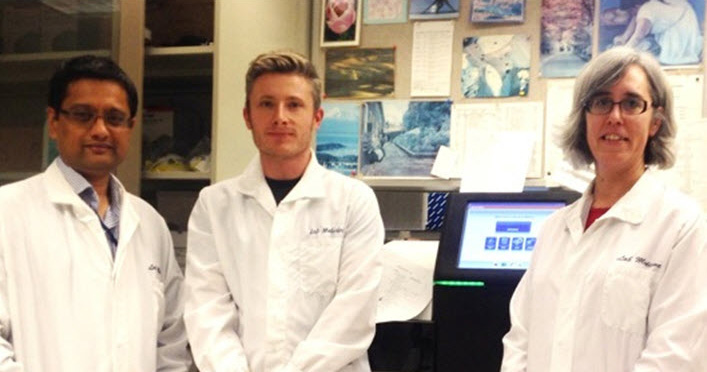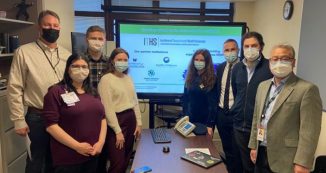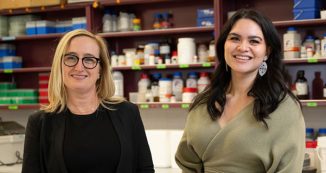29 Oct ITHS Supports Clinical Next Generation Sequencing for Patient Diagnosis

Clinical NGS staff in the Microbiology Section of the Molecular Diagnosis Program in Laboratory Medicine. Pictured (Left to Right): Dhruba SenGupta, PhD, Senior Research Scientist; Dan Hoogestraat, BS, Medical Laboratory Scientist Lead; and Lisa Cummings, BS, MS, Medical Laboratory Scientist II. Not shown: Bioinformaticist Tyler A. Land and Senior Computer Specialist Christopher A. Rosenthal.
Culture methods are a mainstay of traditional diagnostic clinical microbiology. However, culture-based methods of diagnosis often produce uninformative results when patient samples are taken from sites with mixed microbial infections. Challenges also arise when the pathogens of interest are slow or difficult to grow in petri dishes.
To overcome these obstacles, the University of Washington developed Clinical Next Generation Sequencing (NGS), which has improved both the accuracy of diagnoses and our understanding of complex infections. The UW Department of Laboratory Medicine installed an Illumina MiSeq Gene & Small Genome Sequencer in 2013 with initial financial support from the Institute of Translational Health Sciences. As a result, the Department’s laboratory-developed procedures are now available to support patient care for UW Medicine. The Lab Medicine team also continues to design additional methods to aid diagnosis and optimize treatment plans.
“The NGS instrument provided by ITHS jumpstarted our ability to develop and validate assays for diagnosing difficult cases of infection,” said Dr. Brad T. Cookson, UW Professor of Laboratory Medicine and Microbiology and Director of the Microbiology section of the Molecular Diagnosis Program in Laboratory Medicine. “Clinical NGS enables rapid identification of bacteria in polymicrobial samples, including those that are non-culturable. And for strain typing during epidemiological investigations, the resolution of whole genome analysis is unparalleled.”
The molecular microbiology team in Laboratory Medicine includes Assistant Professors Stephen J. Salipante, Noah G. Hoffman, Susan M. Butler-Wu, and April A. Abbott, and Professor Karen Stephens. Their recent publications with collaborators in the UW Departments of Genome Sciences and Microbiology have appeared in the Journal of Clinical Microbiology and the International Journal of Medical Microbiology, where they present the diagnosis of co-infection, the epidemiology and genome plasticity of Methicillin-resistant Staphylococcus aureus (MRSA), and the discovery of a dominant genomospecies among clinical isolates of Corynebacterium jeikeium, an important nosocomial pathogen that attacks patients in the intensive care unit.
The early success of their medical services, and the great promise of additional laboratory-developed procedures for diagnosing complicated infections, motivated Laboratory Medicine to invest in a second instrument to support the increasing demands for clinical NGS in the Department. In July, they also formed the NGS Analytics Laboratory, directed by Dr. Stephen J. Salipante and co-directed by Dr. Noah Hoffman, which is specifically devoted to developing the data analysis pipelines that are crucial to the practical application of massively parallel DNA sequencing technology.
“The Institute of Translational Health Sciences, and particularly Roger Bumgarner, played a key role in getting us started,” concluded Dr. Cookson. “We are fortunate that Dr. Bumgarner correctly predicted that the Illumina sequencing platform would be superior for metabiome analyses, and our recent work has confirmed that he selected the better technology.”
To learn more about clinical NGS at the UW, please visit the Department of Laboratory Medicine’s Molecular Diagnosis Microbiology Section.







